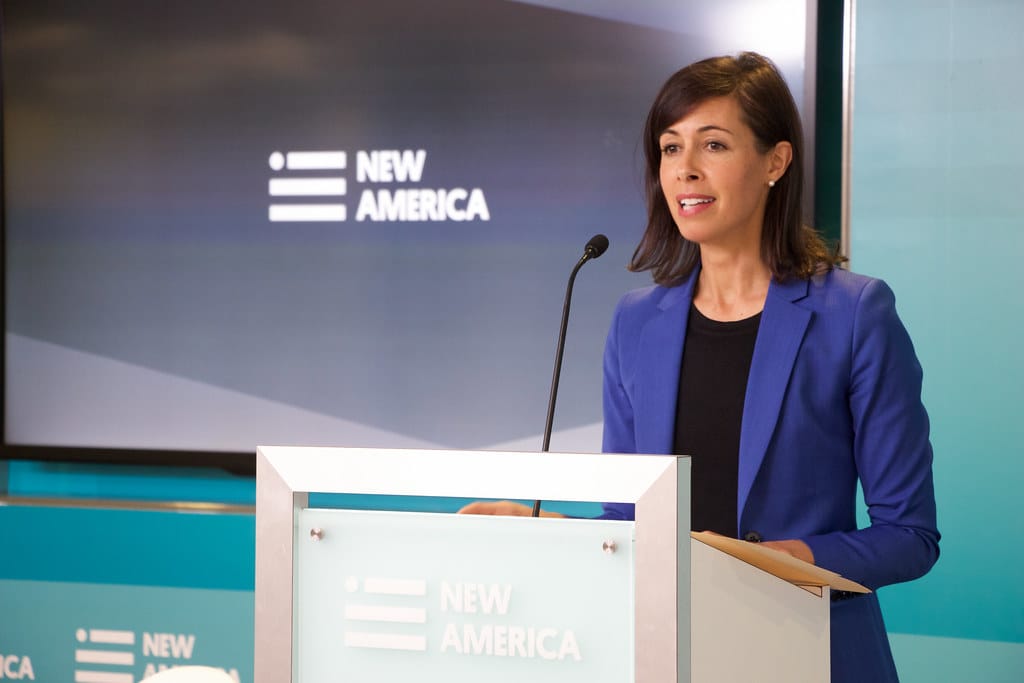FCC Broadband Focus; Facebook Fiber In Indiana; Telco Fiber To 68M Homes; Right Of Repair Bill In Nevada
March 30, 2021 – The Federal Communications Commission is focusing on objectives of President Joe Biden’s $1.9-trillion American Rescue Plan, which includes $7 billion for the E-Rate internet subsidy program, Acting Chairwoman Jessica Rosenworcel said last week. The E-Rate program – which provides i

March 30, 2021 – The Federal Communications Commission is focusing on objectives of President Joe Biden’s $1.9-trillion American Rescue Plan, which includes $7 billion for the E-Rate internet subsidy program, Acting Chairwoman Jessica Rosenworcel said last week.
The E-Rate program – which provides internet subsidies to schools and libraries and has now been expanded to the home — has become a focal point for the agency during the pandemic, as more kids are now doing school at home.
The regulator said this is aligned with its focus on providing broadband access to all Americans because internet has quickly become a “need to have,” not a “nice to have,” Rosenworcel said at a conference hosted by the National Association of Counties on March 24.
The FCC is also currently evaluating applications from internet service providers that want to participate in the $3.2-billion Emergency Broadband Benefit program, announced in December.
Over 380 applications have already come in for the “historic” subsidy from Internet service providers seeking to provide discounted services, the agency said. The FCC will provide $100 to cover a one-time payment for eligible households and up to $50 per month for broadband connections.
The agency is also progressing in developing more accurate broadband coverage maps, Rosenworcel said. This effort has been ongoing since 2017. After taking office in January, she launched a broadband data task force, which began reviewing existing coverage maps which count every home in a census block as being served.
Facebook completes first phase of Indiana fiber
Facebook said Friday it has finished construction of phase one of its 80-mile fiber network running from the Indiana/Ohia border to downtown Indianapolis.
The fiber will be used to connect Facebook’s data centers, and excess capacity will be available to telcos and other providers interested on a wholesale basis, the company said, adding it doesn’t intend on selling internet directly to consumers.
The fiber connects Facebook’s I-70 data centers in the Midwest with its East Coast cluster in Ohio, Virginia, and North Carolina.
Partnering with communications infrastructure provider Zayo, the company said a second phase is underway that will stretch another 85 miles of fiber west from Indianapolis along highway 40 to the Indiana/Illinois border.
The second phase is slated to be completed by the end of this year, it said.
In the U.S., Facebook now has 13 data center locations, eight of which are operational. “The best option for us is to connect to existing fiber, but we prefer to work with our partners to access it,” Michele Kohler, Facebook’s strategic sourcing manager, said, adding the company has been discussing leasing fiber to third parties in Indiana.
Facebook says it has been building broadband networks in the U.S. for four years. It has previously made a 200-mile fiber connection from New Mexico to Texas.
Telco Fiber will reach 68M homes in the U.S. by 2025: analysts
According to a report from financial analysts at Cowen, telecom operators are committed to building fiber to over five million new homes in the U.S. by 2021, capturing 42 million new broadband customers. By 2025, 68 million retail fiber customers are expected, the study found.
At recent AT&T conference told analysts AT&T would expand its fiber reach to three million locations across 90 metro areas this year and add four million fiber-to-the-premises sites by 2022.
Despite being in bankruptcy, Frontier Communications plans to upgrade fiber to three million homes soon, which could double its fiber footprint, it said. It may grow to as much as nine million, depending on the economy, it added.
Cowen said Windstream has 462,000 fiber-connected homes by end of 2020. The company is also planning to upgrade two million homes by the end of 2025 to fiber, which would provide fiber to 70 percent of its service area.
‘Right to Repair’ bill reignites debate on Big Tech regulation
The Nevada state legislature is expected to hold a debate on Monday about a proposal that would require more prominent tech companies to give independent repair shops access to fix devices like computers, phones, tablets, and printers.
As part of its plan on Monday, the Nevada Assembly Committee on Commerce and Labor will consider a proposal requiring manufacturers of digital electronic equipment worth less than $5,000 to make parts, tools, and schematics available to non-authorized repair businesses.
Selena Torres, a Democratic member of the Nevada assembly woman and a Las Vegas English teacher who worked at a repair shop, said her bill would keep electronics repair jobs local rather than requiring people to ship it out of state.
She said consumers would also receive more economical repair options, which can be especially important because the pandemic is forcing students and remote workers to depend on technology.
Technical associations such as TechNet, that lobby for Apple, HP, and Honeywell, have mounted vigorous opposition to state repair bills.
According to David Edmonson, it would make proprietary information and intellectual property vulnerable to replication, potentially compromising user security and privacy.
“It would force manufacturers to treat any independent repair provider in the same way as authorized network providers, but without any of the contractual protections or competency requirements that are put in place to benefit consumers,” he said.
“It’s changed from being able to do anything you want to repair your computer or printer to ‘You can’t do anything now.’ Everything’s changed to being disposable or impossible to repair,” said Curtis Jones from the Technology Center in Sparks.
At least 25 states have introduced legislation known as “right to repair,” including New York, Oregon, and Illinois.
The debate is part of a larger conversation about government regulation of big technology companies.









Member discussion